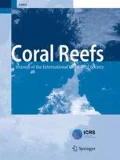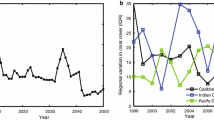Abstract
Climate change will be with us for decades, even with significant reductions in emissions. Therefore, predictions made with respect to climate change impacts on coral reefs need to be highly defensible to ensure credibility over the timeframes this issue demands. If not, a Cassandra syndrome could be created whereby future more well-supported predictions of the fate of reefs are neither heard nor acted upon. Herein, popularising predictions based on essentially untested assumptions regarding reefs and their capacity to cope with future climate change is questioned. Some of these assumptions include that: all corals live close to their thermal limits, corals cannot adapt/acclimatize to rapid rates of change, physiological trade-offs resulting from ocean acidification will lead to reduced fecundity, and that climate-induced coral loss leads to widespread fisheries collapse. We argue that, while there is a place for popularising worst-case scenarios, the coral reef crisis has been effectively communicated and, though this communication should be sustained, efforts should now focus on addressing critical knowledge gaps.
Similar content being viewed by others
References
Anthony KRN, Connolly SR, Hoegh-Guldberg O (2007) Bleaching, energetics, and coral mortality risk: Effects of temperature, light, and sediment regime. Limnol Oceanogr 52:716–726
Babcock RC (1991) Comparative demography of 3 species of scleractinian corals using age-dependent and size-dependent classifications. Ecol Monogr 61:225–244
Baird AH, Marshall PA (2002) Mortality, growth and reproduction in scleractinian corals following bleaching on the Great Barrier Reef. Mar Ecol Prog Ser 237:133–141
Baird AH, Cumbo VR, Leggat B, Rodriguez-Lanetty M (2007) Fidelity and flexibility in coral algal symbioses. Mar Ecol Prog Ser 347:307–309
Berkelmans R, van Oppen M (2006) The role of zooxanthellae in the thermal tolerance of corals: a ‘nugget of hope’ for coral reefs in an era of climate change. Proc R Soc Lond B Biol Sci 273:2305–2312
Brander KM (2007) Global fish production and climate change. Proc Natl Acad Sci USA 104:19709–19714
Chesher RH (1969) Destruction of pacific corals by the sea star Acanthaster planci. Science 165:280–283
Coles SL, Brown BE (2003) Coral bleaching—capacity for acclimatization and adaptation. Adv Mar Biol 46:183–223
Donner SD, Skirving WJ, Little CM, Oppenheimer M, Hoegh-Guldberg O (2005) Global assessment of coral bleaching and required rates of adaptation under climate change. Global Change Biol 11:2251–2265
Edmondson CH (1928) The ecology of an Hawaiian coral reef. Bishop Mus Occas Pap 45:1–64
Garant D, Forde SE, Hendry AP (2007) The multifarious effects of dispersal and gene flow on contemporary adaptation. Funct Ecol 21:434–443
Glynn PW, Mate JL, Baker AC, Calderon MO (2001) Coral bleaching and mortality in Panama and Ecuador during the 1997–1998 El Nino-Southern oscillation event: Spatial/temporal patterns and comparisons with the 1982–1983 event. Bull Mar Sci 69:79–109
Goreau TJ, McClanahan TR, Hayes RL, Strong A (2000) Conservation of coral reefs after the 1998 global bleaching event. Conserv Biol 14:5–15
Graham NAJ, Wilson SK, Jennings S, Polunin NVC, Bijoux JP, Robinson J (2006) Dynamic fragility of oceanic coral reef ecosystems. Proc Natl Acad Sci USA 103:8425–8429
Graham NAJ, Wilson SK, Jennings S, Polunin NVC, Robinson JAN, Bijoux JP, Daw TM (2007) Lag effects in the impacts of mass coral bleaching on coral reef fish, fisheries, and ecosystems. Conserv Biol 21:1291–1300
Graham ER, Baird AH, Connolly SR (2008) Survival dynamics of scleractinian coral larvae and implications for dispersal. Coral Reefs DOI 10.1007/s00338–008–0361-z
Grandcourt EM, Cesar HSJ (2003) The bio-economic impact of mass coral mortality on the coastal reef fisheries of the Seychelles. Fish Res 60:539–550
Grigg RW (1992) Coral reef environmental science: truth versus the Cassandra Syndrome. Coral Reefs 11:183–186
Halford A, Cheal AJ, Ryan D, Williams DB (2004) Resilience to large-scale disturbance in coral and fish assemblages on the Great Barrier Reef, Australia. Ecology 85:1892–1905
Hellberg ME (2007) Footprints on water: the genetic wake of dispersal among reefs. Coral Reefs 26:463–473
Hoegh-Guldberg O (1999) Climate change, coral bleaching and the future of the world’s coral reefs. Mar Freshw Res 50:839–866
Hoegh-Guldberg O, Mumby PJ, Hooten AJ, Steneck RS, Greenfield P, Gomez E, Harvell CD, Sale PF, Edwards AJ, Caldeira K, Knowlton N, Eakin CM, Iglesias-Prieto R, Muthiga N, Bradbury RH, Dubi A, Hatziolos ME (2007) Coral reefs under rapid climate change and ocean acidification. Science 318:1737–1742
Hughes TP, Ayre D, Connell JH (1992) The evolutionary ecology of corals. Trends Ecol Evol 7:292–295
Hughes TP, Baird AH, Dinsdale EA, Moltschaniwskyj NA, Pratchett MS, Tanner JE, Willis BL (2000) Supply-side ecology works both ways: the link between benthic adults, fecundity, and larval recruits. Ecology 81:2241–2249
Hughes TP, Baird AH, Bellwood DR, Card M, Connolly SR, Folke C, Grosberg R, Hoegh-Guldberg O, Jackson JBC, Kleypas J, Lough JM, Marshall P, Nystrom M, Palumbi SR, Pandolfi JM, Rosen B, Roughgarden J (2003) Climate change, human impacts, and the resilience of coral reefs. Science 301:929–933
IPCC (2007) Climate Change 2007: The Physical Science Basis. Contribution of Working Group I to the Fourth Assessment Report of the Intergovernmental Panel on Climate Change. Cambridge Univ. Press, Cambridge
Jackson JBC, Kirby MX, Berger WH, Botsford LW, Bourque BJ, Bradbury RH, Cooke R, Erlandson Estes JA, Hughes TP, Kidwell S, Lange CB, Lenihan HS, Pandolfi JM, Peterson CH, Steneck RS, Tegner MJ, Warner RR (2001) Historical overfishing and the recent collapse of coastal ecosystems. Science 293:629–637
Knowlton N (2001) The future of coral reefs. Proc Natl Acad Sci USA 98:5419–5425
Loya Y, Sakai K, Yamazato K, Nakano Y, Sambali H, van Woesik R (2001) Coral bleaching: the winners and the losers. Ecol Lett 4:122–131
Marshall PA, Baird AH (2000) Bleaching of corals on the Great Barrier Reef: differential susceptibilities among taxa. Coral Reefs 19:155–163
Mayer AG (1918) Toxic effects due to high temperature. Pap Dep Mar Biol Carnegie Inst Wash 12:173–178
Maynard JA, Anthony KRN, Marshall PA, Masiri I (2008) Major bleaching events can lead to increased thermal tolerance in corals. Mar Biol 155:173–182
McClanahan TR (2002) The near future of coral reefs. Environ Conserv 29:460–483
McClanahan T, Maina J, Pet-Soede L (2002) Effects of the 1998 coral morality event on Kenyan coral reefs and fisheries. Ambio 31:543–550
McClanahan TR, Ateweberhan M, Sebastian CR, Graham NAJ, Wilson SK, Bruggemann JH, Guillaume MMM (2007) Predictability of coral bleaching from synoptic satellite and in situ temperature observations. Coral Reefs 26:695–701
McClanahan T, Weil E, Cortés J, Baird AH, Ateweberhan M (2009) Consequences of coral bleaching for sessile reef organisms. In: van Oppen MJH, Lough JM (eds) Ecological studies: coral bleaching: patterns, processes, causes and consequences. Springer-Verlag, Berlin
Munday PL, Jones GP, Pratchett MS, Williams AJ (2008) Climate change and the future for coral reef fishes. Fish Fish 9:1–25
Potts D (1984) Generation times and the Quaternary evolution of reef-building corals. Paleobiology 10:48–58
Pratchett MS, Munday PL, Wilson SK, Graham NAJ, Cinner J, Bellwood D, Jones GB, Polunin N, McClanaban TR (2008) Effects of climate induced coral bleaching on coral reef fishes - ecological and economic consequences. Oceanogr Mar Biol Annu Rev 46:251–296
Rinkevich B, Loya Y (1979) Reproduction of the Red-Sea coral Stylophora pistillata 2. Synchronization in breeding and seasonality of planulae shedding. Mar Ecol Prog Ser 1:145–152
Sheppard CRC (2003) Predicted recurrences of mass coral mortality in the Indian Ocean. Nature 425:294–297
Underwood JN, Smith LD, van Oppen MJH, Gilmour JP (2007) Multiple scales of genetic connectivity in a brooding coral on isolated reefs following catastrophic bleaching. Mol Ecol 16:771–784
Visser ME (2008) Keeping up with a warming world; assessing the rate of adaptation to climate change. Proc R Soc Biol Sci Ser B 275:649–659
Wilson SK, Graham NAJ, Pratchett MS, Jones GP, Polunin NVC (2006) Multiple disturbances and the global degradation of coral reefs: are reef fishes at risk or resilient? Global Change Biol 12:2220–2234
Acknowledgements
The authors are indebted to several anonymous reviewers who provided insightful comments on draft versions of the manuscript. This work was supported by grants from the University of Melbourne and the Applied Environmental Decision Analysis CERF Hub to JAM and the ARC to AHB and MSP, and JSPS to AHB.
Author information
Authors and Affiliations
Corresponding author
Additional information
Communicated by Environment Editor Prof. Rob van Woesik
Rights and permissions
About this article
Cite this article
Maynard, J.A., Baird, A.H. & Pratchett, M.S. Revisiting the Cassandra syndrome; the changing climate of coral reef research. Coral Reefs 27, 745–749 (2008). https://doi.org/10.1007/s00338-008-0432-1
Received:
Revised:
Accepted:
Published:
Issue Date:
DOI: https://doi.org/10.1007/s00338-008-0432-1




